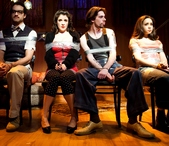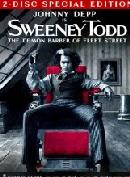SITE GUIDE
SEARCH
ADVERTISING AT CURTAINUP
REVIEWS
FEATURES
NEWS
Etcetera and
Short Term Listings
LISTINGS
Broadway
Off-Broadway
NYC Restaurants
BOOKS and CDs
OTHER PLACES
Berkshires
London
California
New Jersey
Philadelphia
Elsewhere
QUOTES
TKTS
PLAYWRIGHTS' ALBUMS
LETTERS TO EDITOR
FILM
LINKS
MISCELLANEOUS
Free Updates
Masthead
Writing for Us
A CurtainUp San Francisco Review
Den of Thieves
|
Recovery's about progress, not perfection.—Paul
|

From left to right: Casey Jackson, Corinne Proctor, Chad Deverman, and Katie Tkel.
|
We meet Maggie and Paul in her tiny New York City apartment after a support meeting for kleptomaniacs. With hundreds of "theft-free" days already to his credit, the straight-laced Paul has become Maggie's sponsor, although he clearly—and comically—has romantic designs on her as well. Maggie has just confessed to filching $800 from Paul's wallet, when someone pounds on the door. Enter Flaco, her violence-prone, faux-Latino ex-boyfriend. (Pardon the excessive hyphenation: This character, at least as portrayed by the charismatic Chad Deverman, literally bounces from one mood to another, shifting around with such sinister and seismic energy that he almost seems to exist on a hyphen.)
Fired up by jealousy and paranoia, Flaco pounces on Paul with a gun in hand, but backs off when he learns that Paul has lock-picking skills. Flaco, it seems, has come across a gold mine of an opportunity and is making plans to steal $750,000 in drug money from a safe in a Tribeca club. Paul hesitates, but finally agrees to participate, with two stipulations: that they carry no guns, and that they donate most of the money to charity.
The "Den of Thieves" of the title, it turns out, refers to Paul's grandfather's crime organization, a group of nonviolent Jewish men who left Paul with a strong sense of "criminal philanthropy." Flaco balks, but then concedes to these demands. After all, with Paul to crack the safe, Flaco to distract the club owner, and Maggie and Boochie (Flaco's new girlfriend) as lookouts, the plan should be foolproof, right? Except of course, predictably, we already know the answer to that question.
The second act opens in a more literal den of thieves— the basement of the club, where the four conspirators are taped to chairs with bags over their heads. Apparently, the money wasn't so "clean" after all, and, during their nonviolent prank, they irked some very violent criminals. Big Tuna, the boss of the organization, is away, so his son, Little Tuna, is left to handle the situation. Although his surly cousin Sal is game to kill them all, Little Tuna, who seems like he would rather befriend than behead the robbers, decides to give them until dawn to decide their own fate. They owe him one life and three thumbs, he announces, but they get to decide who will die and who will be maimed.
Like the work of the English playwright Martin McDonagh—a witty master of the macabre whose current play, A Behanding in Spokane, just opened on Broadway— Guirgis's style relies on dark humor, often smacking of the absurd and crackling with irony. A playwright, screenwriter, and actor, Guirgis is also co-artistic director of the LAByrinth Theater Company, and his plays, including Jesus Hopped the 'A' Train and Our Lady of 121st Sreet, have become downtown classics.
Den of Thieves, however, isn't immediately an exceptionally compelling work; the acts are unbalanced (the second act is much longer and quickly loses steam), for one thing, and the situations never feel quite fully formed. But where the play ignites, surprisingly, is when the physical action is paralyzed. Anchored by duct tape, the four central characters must each make a case for their lives, and their only tools are their wits and their voices.
And that tightly stretched tape seems to squeeze truth (or something like it) from each imprisoned character. The real gangsters may be lightweight caricatures, but the amateurs suddenly become more complex, and the actors step up to the task. Casey Jackson, in particular, turns in a finely nuanced performance as the nerdy Paul, from his furiously blinking eyes (trapped behind thick glasses, of course) to his carefully, almost painfully, pronounced words. And although her thick (Spanish?) accent sometimes clogs her articulation, Corinne Proctor does a lovely job of spinning Boochie's sob story into a strong plea for survival.
In an interview, Guirgis once called theater "an experience that celebrates and examines and mourns and laughs and cries and affirms and helps organize our collective humanity and the life we all walk through, more often than not alone." By the end of Den of Thieves, it's clear that this group of characters—all of indeterminate origins and questionable motivations—are both together and alone, but they're suddenly on equal footing in a situation in which compulsiveness, Guirgis suggests, might very well save your life.
|
Den of Thieves By Stephen Adly Guirgis Directed by Susi Damilano Cast: Kathryn Tkel (Maggie), Casey Jackson (Paul), Chad Deverman (Flaco), Corinne Proctor (Boochie), Peter Ruocco (Sal), Ashkon Davaran (Little Tuna), and Joe Madero (Big Tuna) Set Design: Bill English Costume Design: Bree Hylkema Lighting Design: Lucas Krech Sound Design: Lorin King Properties: Seren Helday and Mia Baxter Video & Body Art: Tatjana Genser Stage Manager: Michae Suenkel Running Time: 2 hours, with a 15-minute intermission San Francisco Playhouse, 533 Sutter Street (415) 677-9596 Tickets ($40.00) Performances: Tuesdays at 7pm, Wednesdays through Saturdays at 8pm, Saturdays at 3pm From 3/9/2010; opening 3/13/10; closes 4/17/10 Review by Amy Krivohlavek based on performance 3/16/10 |
|
Subscribe to our FREE email updates with a note from editor Elyse Sommer about additions to the website -- with main page hot links to the latest features posted at our numerous locations. To subscribe,
E-mail:
 esommer@curtainup.comesommer@curtainup.com esommer@curtainup.comesommer@curtainup.comput SUBSCRIBE CURTAINUP EMAIL UPDATE in the subject line and your full name and email address in the body of the message -- if you can spare a minute, tell us how you came to CurtainUp and from what part of the country. Visit Curtainup's Blog Annex Curtainup at Facebook . . . Curtainup at Twitter REVIEW FEEDBACK Highlight one of the responses below and click "copy" or"CTRL+C"
Paste the highlighted text into the subject line (CTRL+ V): Feel free to add detailed comments in the body of the email. . .also the names and emails of any friends to whom you'd like us to forward a copy of this review. |






